
PFERDEHEILKUNDE
Scope & Guideline
Exploring the forefront of equine medicine and welfare.
Introduction
Aims and Scopes
- Clinical Veterinary Research:
Focuses on clinical studies that evaluate treatment outcomes, diagnostic methods, and surgical techniques in horses, emphasizing evidence-based practices. - Equine Physiology and Performance:
Examines physiological responses to exercise, training regimens, and the impact of nutrition on performance, contributing to improved athletic management of horses. - Equine Welfare and Ethics:
Addresses issues related to the welfare of horses in various settings, including racing and sport, and explores ethical considerations in equine management. - Infectious Diseases and Epidemiology:
Investigates the prevalence, diagnosis, and treatment of infectious diseases in horses, contributing to public health and veterinary epidemiology. - Innovative Diagnostic and Therapeutic Techniques:
Highlights advancements in veterinary technology, including imaging techniques and novel therapeutic interventions, to enhance equine healthcare.
Trending and Emerging
- Equine Sports Medicine:
An increasing number of studies are addressing sports-related injuries, training effects, and performance optimization, reflecting the rising interest in equine athletes and their management. - Use of Advanced Imaging Techniques:
There is a notable trend towards utilizing advanced imaging modalities, such as MRI and ultrasound, for better diagnosis and management of equine conditions, showcasing technological advancements. - Infectious Disease Control and Prevention:
Research on infectious diseases, particularly in light of recent global health concerns, is gaining more attention, focusing on prevention strategies and vaccination protocols. - Equine Behavioral Studies:
Emerging studies are exploring horse behavior and welfare, including the impact of training methods and environmental factors on equine psychology, which is becoming a priority in veterinary research. - Pharmacological Innovations:
There is a growing interest in the use of novel pharmacological agents and therapies for treating various equine conditions, indicating a trend towards personalized medicine in equine healthcare.
Declining or Waning
- Historical Perspectives on Equine Medicine:
Papers focusing on the historical development of equine veterinary practices are becoming less frequent, suggesting a shift toward contemporary issues and clinical applications. - Traditional Surgical Techniques:
There is a noted decrease in studies centered on conventional surgical methods, likely replaced by a growing interest in minimally invasive techniques and novel therapies. - General Nutrition Studies:
Research focused on broad nutritional aspects without specific applications or innovative approaches is less prevalent, indicating a move towards more targeted dietary interventions.
Similar Journals
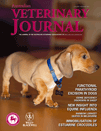
AUSTRALIAN VETERINARY JOURNAL
Fostering collaboration for impactful veterinary advancements.AUSTRALIAN VETERINARY JOURNAL, published by Wiley, is a leading journal dedicated to advancing the field of veterinary science. With a rich history dating back to 1925, this journal has become a vital resource for researchers, professionals, and students interested in veterinary medicine and its diverse applications. As evidenced by its impressive Scopus ranking, placing it in the 67th percentile among General Veterinary publications, and categorized within Q3 of the Medicine (miscellaneous) and Q2 of the Veterinary (miscellaneous) quartiles for 2023, AUSTRALIAN VETERINARY JOURNAL is recognized for its commitment to quality research and impactful contributions. Although not an open access journal, it continues to be an essential platform for disseminating vital findings and innovations within the veterinary community, fostering collaboration and advancement in animal health and welfare.

Medycyna Weterynaryjna-Veterinary Medicine-Science and Practice
Advancing Veterinary Knowledge for a Healthier FutureMedycyna Weterynaryjna-Veterinary Medicine-Science and Practice, published by the Polish Society of Veterinary Sciences Editorial Office, stands as a significant contributor to the field of veterinary medicine, focusing on various aspects of animal health and clinical practice. Established in 1945, this journal has continuously evolved, embracing the latest developments in veterinary science, making it an essential resource for researchers, professionals, and students alike. With an ISSN of 0025-8628, it is indexed in Scopus, currently ranked in the 22nd percentile within the Veterinary category, and has accordingly been placed in Q4 of the category quartiles as of 2023, reflecting its niche yet vital contributions to the field. Although currently not open access, the journal’s value is underscored by its dedication to disseminating scientific knowledge and advancements that enhance animal health and welfare in Poland and beyond. The editorial office is located in Lublin, Poland, serving as a hub for veterinary professionals seeking to publish and stay updated on contemporary issues in veterinary practice.
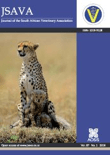
Journal of the South African Veterinary Association
Connecting Researchers for a Healthier TomorrowJournal of the South African Veterinary Association is a prominent Open Access journal dedicated to advancing the field of veterinary science since its inception in 1945. Published by MEDPHARM PUBLICATIONS PTY LTD, this journal stands out with an impactful HIndex and a commendable categorization in 2023, ranking Q3 in Medicine (miscellaneous) and Q2 in Veterinary (miscellaneous). With a Scopus rank of 96 out of 194 in the veterinary field, it serves as an essential resource for researchers, veterinary professionals, and students, promoting the dissemination of high-quality research and knowledge. The journal offers a platform for peer-reviewed articles covering diverse topics relevant to veterinary and animal health issues, encouraging expansive dialogue and collaboration within the academic community. Based in Centurion, South Africa, and accessible globally since it adopted an Open Access model in 1997, the journal exemplifies a commitment to accessibility and the sharing of knowledge.
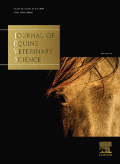
JOURNAL OF EQUINE VETERINARY SCIENCE
Transforming equine health with groundbreaking studies.JOURNAL OF EQUINE VETERINARY SCIENCE, published by Elsevier Science Inc, serves as a premier platform for disseminating innovative research in the field of equine veterinary medicine. With an ISSN of 0737-0806 and an E-ISSN of 1542-7412, this journal has been a beacon of scholarly work since its inception in 1981, projected to maintain its commitment to excellence through 2024. Renowned for its rigorous peer-review process, the journal is currently ranked Q2 in the equine category, showcasing its significance in the veterinary field, particularly within the competitive Scopus ranks where it holds the 3rd position out of 11 evaluated journals, placing it in the 77th percentile. Although not an open-access publication, its contributions are accessible through institutional subscriptions, ensuring that vital research reaches a wide audience of equine veterinarians, researchers, and students. The journal aims to advance the understanding of equine health and welfare, making it an invaluable resource for those dedicated to improving animal care and advancing the science of veterinary medicine.
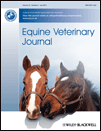
EQUINE VETERINARY JOURNAL
Pioneering research for a healthier future for equines.EQUINE VETERINARY JOURNAL, published by Wiley, stands as a leading publication in the field of veterinary science, specifically focusing on the welfare and health of equines. Established in 1968, this esteemed journal has garnered a reputation for excellence, reflected in its impressive impact factor and its categorization as a Q1 journal in Equine studies and Q2 in Medicine (miscellaneous) for 2022. As a vital resource for researchers, practitioners, and students alike, the EQUINE VETERINARY JOURNAL presents innovative research, clinical studies, and reviews that push the boundaries of equine veterinary practice. With its rigorous peer-review process and commitment to advancing knowledge, this journal is an indispensable tool for anyone involved in equine health and welfare. It is available in both print and online formats, ensuring accessibility for a global readership.
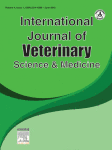
International Journal of Veterinary Science and Medicine
Unlocking the future of animal health through innovation.Welcome to the International Journal of Veterinary Science and Medicine, a leading platform for the dissemination of innovative research in the field of veterinary science. Published by TAYLOR & FRANCIS LTD, this esteemed journal has maintained an Open Access policy since 2013, ensuring widespread accessibility and engagement with cutting-edge veterinary studies. With an impressive impact factor and a Category Quartile ranking of Q1 in Veterinary (miscellaneous) as of 2023, it stands out as one of the top journals in its field, ranking #16 out of 194 in the Scopus Veterinary category, placing it in the 92nd percentile of academic publications. The journal encourages submissions of high-quality research and articles that contribute to advancements in veterinary medicine, ranging from clinical studies to public health implications. Located in the United Kingdom, the journal aims to foster collaboration and communication among veterinary professionals, researchers, and students, making it an indispensable resource for anyone involved in this vital field.
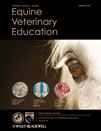
EQUINE VETERINARY EDUCATION
Empowering veterinary excellence in equine care.EQUINE VETERINARY EDUCATION is a premier academic journal dedicated to the field of veterinary science, particularly focusing on equine health and education. Published by WILEY, this influential publication boasts a robust history, having served the academic community since 1989. With an impressive Scopus ranking within the top 4 of 11 in the equine veterinary category and a 68th percentile placement, it underscores its significant contribution to advancing knowledge in the field. Although it does not offer Open Access, EQUINE VETERINARY EDUCATION provides critical insights and research that inform best practices and innovative approaches in equine care and management. The journal aims to foster the development of veterinary education through high-quality research articles, reviews, and case studies, making it an essential resource for researchers, practitioners, and students committed to enhancing equine veterinary knowledge and practices.
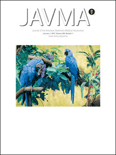
JAVMA-JOURNAL OF THE AMERICAN VETERINARY MEDICAL ASSOCIATION
Driving excellence in veterinary research and education.JAVMA - Journal of the American Veterinary Medical Association, a leading publication in the field of veterinary medicine, has been a cornerstone of veterinary research and practice since its inception in 1945. Published by the American Veterinary Medical Association, this esteemed journal provides a vital platform for disseminating innovative studies, clinical findings, and advancements that enhance the welfare of animals and the practice of veterinary medicine. With an impressive impact factor reflecting its scholarly influence and a position in the top quartile (Q2) among veterinary journals, JAVMA is recognized for its rigorous peer-review process and high-quality content. Although the journal does not offer Open Access, it remains accessible through a variety of academic libraries and institutions, making it a crucial resource for researchers, veterinarians, and students dedicated to advancing the field. With a Scopus rank of #92 out of 194 in the general veterinary category, JAVMA is committed to fostering knowledge and discussions that shape the future of veterinary science.

BERLINER UND MUNCHENER TIERARZTLICHE WOCHENSCHRIFT
Pioneering Research for a Healthier Animal WorldBERLINER UND MUNCHENER TIERARZTLICHE WOCHENSCHRIFT is an esteemed journal in the fields of Veterinary Science and Medicine, published by SCHLUETERSCHE VERLAGSGESELLSCHAFT MBH & CO KG. Since its inception in 1946, this journal has served as a vital platform for advancing knowledge and research in veterinary medicine within Germany and beyond. With a current impact factor that places it in the Q4 category in both Medicine and Veterinary, it continues to provide significant insights for professionals, researchers, and students engaged in the veterinary community. Although it is not an Open Access journal, its rich content contributes to the foundational literature of the field, making it an essential reference. Researchers looking to publish their findings or keep informed on the latest advancements in veterinary and medical practices will find this journal an invaluable resource. It is headquartered in Hannover, Germany, and serves as a testament to the ongoing dedication to veterinary research since the mid-20th century.

Revista Romana de Medicina Veterinara
Advancing veterinary science for a healthier tomorrow.Revista Romana de Medicina Veterinara is a leading peer-reviewed journal dedicated to the field of veterinary medicine, published by the General Association of Romanian Veterinarians. With its ISSN 1220-3173 and E-ISSN 2457-7618, the journal aims to advance the domain of veterinary science through dissemination of high-quality research articles, case studies, and reviews that cover a wide array of topics including animal health, veterinary diagnostics, and treatment methodologies. Although primarily focused on the Romanian veterinary landscape, its scope is designed to engage a global audience of researchers, practitioners, and students seeking to enhance their knowledge and practice in veterinary medicine. The journal is committed to open accessibility, ensuring that vital research is readily available to the academic community without financial barriers, thereby encouraging collaboration and innovation. By providing a platform for cutting-edge veterinary research, Revista Romana de Medicina Veterinara plays a crucial role in fostering advancements that can significantly impact animal health and welfare both locally and internationally.